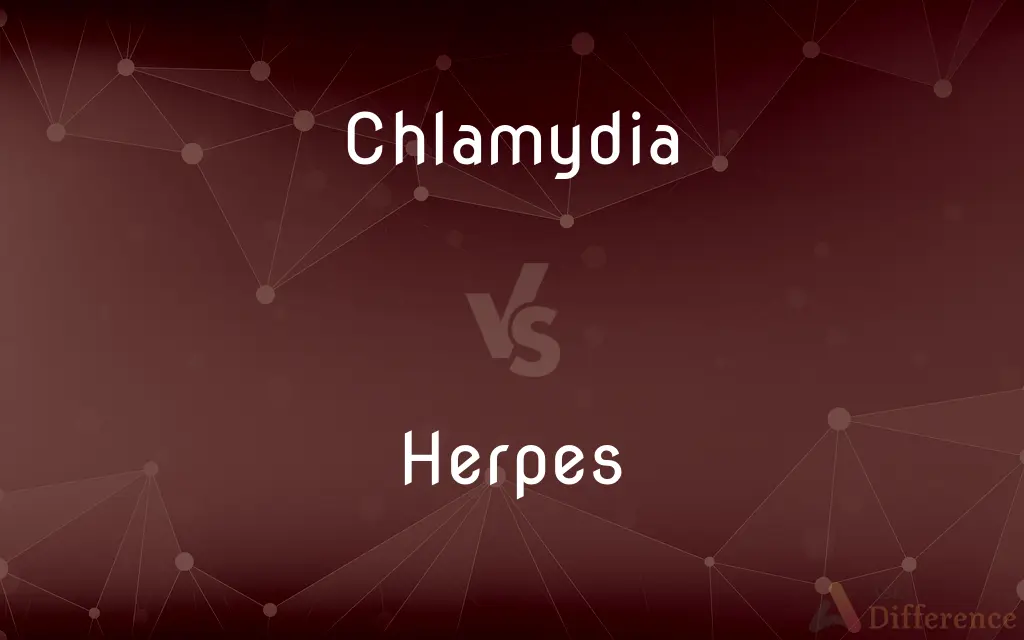Chlamydia vs. Herpes — What's the Difference?
By Tayyaba Rehman & Maham Liaqat — Updated on April 1, 2024
Chlamydia is a bacterial infection treatable with antibiotics, focusing on reproductive organs, while herpes is a viral infection causing lifelong symptoms and outbreaks on skin or mucous membranes.

Difference Between Chlamydia and Herpes
Table of Contents
ADVERTISEMENT
Key Differences
Chlamydia is a sexually transmitted infection (STI) caused by the bacterium Chlamydia trachomatis. It primarily affects the reproductive organs, often presenting with few or no symptoms initially. Whereas herpes is caused by the herpes simplex virus (HSV), leading to outbreaks of sores on the mouth or genital areas, and unlike chlamydia, it remains in the body for life.
Chlamydia can be cured with antibiotics, typically clearing the infection within one to two weeks. On the other hand, there is no cure for herpes; treatment focuses on managing symptoms and reducing the frequency of outbreaks.
While chlamydia infections can lead to serious reproductive health issues, such as pelvic inflammatory disease (PID) if left untreated, herpes can cause painful sores and emotional distress due to the stigma associated with the infection but does not typically result in significant health complications beyond the outbreaks.
Chlamydia is diagnosed through specific laboratory tests of urine or swabs from the genital area. In contrast, herpes diagnosis may involve physical examination of outbreaks, swabs of sores, and blood tests to detect the presence of HSV antibodies.
Prevention of chlamydia involves the use of condoms and regular STI screenings for sexually active individuals. Conversely, herpes prevention includes avoiding contact with open sores, using condoms, and taking antiviral medication if prescribed by a healthcare provider.
ADVERTISEMENT
Comparison Chart
Cause
Chlamydia trachomatis bacterium
Herpes simplex virus (HSV)
Symptoms
Often asymptomatic, can include genital pain and discharge
Blisters or sores on the genitals or mouth
Treatment
Antibiotics
Antiviral medications
Impact on Health
Can cause PID and infertility if untreated
Recurrent outbreaks, rarely severe health complications
Prevention
Condoms, regular screenings
Avoiding contact with sores, condoms, antiviral medication
Compare with Definitions
Chlamydia
Chlamydia trachomatis Bacterial Infection.
Chlamydia infections require antibiotics for treatment and can be fully cured.
Herpes
Herpes Simplex Virus Infection.
Herpes is a lifelong infection with no cure, managed with antiviral medications.
Chlamydia
Asymptomatic Nature.
Many individuals with chlamydia do not experience noticeable symptoms.
Herpes
Sores on Mouth or Genitals.
Herpes can cause painful blisters or sores on the lips, genital area, or anus.
Chlamydia
Reproductive System Effects.
Untreated chlamydia can lead to pelvic inflammatory disease in women.
Herpes
Characterized by Recurrent Outbreaks.
Herpes outbreaks can be triggered by stress, illness, or sun exposure.
Chlamydia
STI Screenings for Diagnosis.
Diagnosing chlamydia involves specific laboratory tests like urine analysis.
Herpes
Blood Tests for HSV Antibodies.
Herpes is diagnosed through blood tests and swab tests of the affected area.
Chlamydia
Chlamydia, or more specifically a chlamydia infection, is a sexually transmitted infection caused by the bacterium Chlamydia trachomatis. Most people who are infected have no symptoms.
Herpes
Any of several viral infections marked by the eruption of small vesicles on the skin or mucous membranes, especially herpes simplex.
Chlamydia
Any of various gram-negative, coccoid bacteria of the genus Chlamydia, especially C. psittaci and C. trachomatis, that are pathogenic to humans and other animals, causing infections such as conjunctivitis in cattle and sheep and trachoma, urethritis, and pneumonia in humans.
Herpes
(medicine) A viral infection, caused by Human alphaherpesvirus 1 and Human alphaherpesvirus 2, marked by painful, watery blisters in the skin or mucous membranes or on the genitals.
Chlamydia
Any of several common, often asymptomatic, sexually transmitted diseases caused by the bacterium Chlamydia trachomatis.
Herpes
An eruption of the skin, taking various names, according to its form, or the part affected, caused by a herpesvirus infection; especially, an eruption of vesicles in small distinct clusters, accompanied with itching or tingling, including shingles, ringworm, and the like; - so called from its tendency to creep or spread from one part of the skin to another.
Chlamydia
(uncountable) Any of several common, often asymptomatic, sexually transmitted diseases caused by the microorganism Chlamydia trachomatis.
Herpes
Viral diseases causing eruptions of the skin or mucous membrane
Chlamydia
(countable) Any of various coccoid microorganisms of the genus Chlamydia that are pathogenic to humans and other animals.
Herpes
Any of the animal viruses that cause painful blisters on the skin
Chlamydia
A coccoid rickettsia which may infect birds and mammals; it causes infections of eyes and lungs and the genitourinary tract.
Chlamydia
A sexually transmitted infection caused by bacteria of the genus Chlamydia
Chlamydia
Coccoid rickettsia infesting birds and mammals; cause infections of eyes and lungs and genitourinary tract
Common Curiosities
Is herpes always contagious?
Herpes can be more contagious during outbreaks, but viral shedding can occur even without visible sores.
Can chlamydia be completely cured?
Yes, chlamydia can be completely cured with the right course of antibiotics.
What are the long-term effects of chlamydia?
If untreated, chlamydia can lead to pelvic inflammatory disease, infertility, and ectopic pregnancy.
How can I prevent getting chlamydia or herpes?
Use condoms during sex, limit the number of sexual partners, and engage in regular STI screenings.
Can pregnant women pass chlamydia or herpes to their babies?
Yes, both infections can be transmitted to the baby during childbirth.
How often should I get tested for chlamydia and herpes?
Testing frequency should be based on your sexual activity, but annually is recommended for sexually active individuals.
Can chlamydia turn into herpes?
No, chlamydia and herpes are caused by different pathogens and one cannot turn into the other.
How do you catch chlamydia and herpes?
Both can be caught through sexual contact with an infected person, including vaginal, anal, and oral sex.
Can you have chlamydia and herpes at the same time?
Yes, it's possible to be infected with both chlamydia and herpes simultaneously.
Do symptoms of chlamydia and herpes differ in men and women?
Symptoms can vary, but both infections often present more subtly in women than in men.
What triggers herpes outbreaks?
Stress, illness, menstrual periods, and sun exposure can trigger herpes outbreaks.
Can chlamydia and herpes be transmitted through kissing?
Herpes can be transmitted through kissing if there are oral sores, but chlamydia typically cannot.
What is the treatment for pregnant women with chlamydia or herpes?
Pregnant women with chlamydia are treated with safe antibiotics, while herpes management might include antiviral medication.
Can using condoms prevent the transmission of chlamydia and herpes completely?
While condoms significantly reduce the risk, they do not eliminate it entirely, especially for herpes, which can affect areas not covered by a condom.
Is there a vaccine for chlamydia or herpes?
As of now, there are no vaccines for chlamydia or herpes.
Share Your Discovery

Previous Comparison
Lymphocyte vs. Macrophage
Next Comparison
Rhyme vs. LimerickAuthor Spotlight
Written by
Tayyaba RehmanTayyaba Rehman is a distinguished writer, currently serving as a primary contributor to askdifference.com. As a researcher in semantics and etymology, Tayyaba's passion for the complexity of languages and their distinctions has found a perfect home on the platform. Tayyaba delves into the intricacies of language, distinguishing between commonly confused words and phrases, thereby providing clarity for readers worldwide.
Co-written by
Maham Liaqat















































